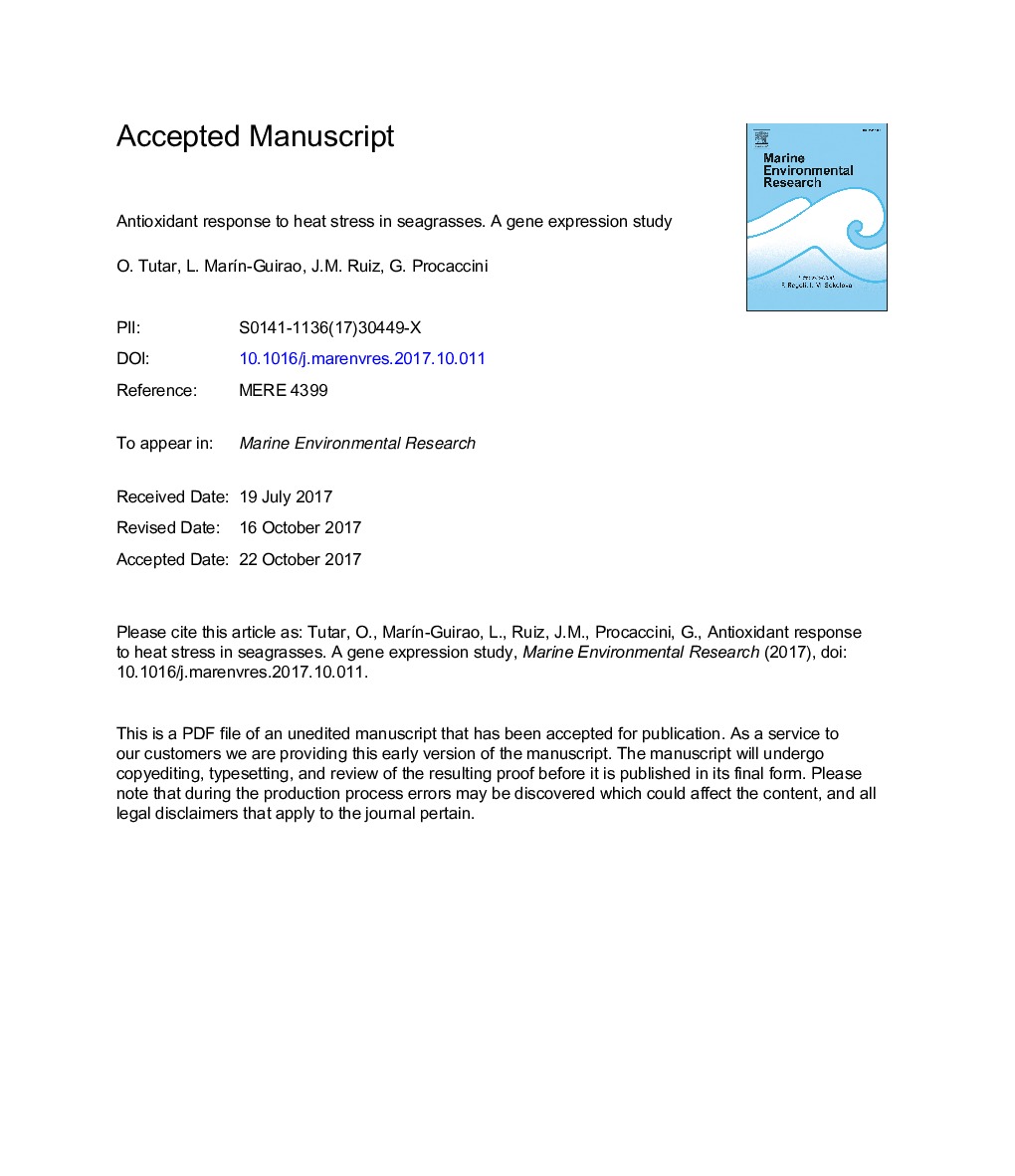| کد مقاله | کد نشریه | سال انتشار | مقاله انگلیسی | نسخه تمام متن |
|---|---|---|---|---|
| 8886417 | 1627551 | 2017 | 40 صفحه PDF | دانلود رایگان |
عنوان انگلیسی مقاله ISI
Antioxidant response to heat stress in seagrasses. A gene expression study
ترجمه فارسی عنوان
پاسخ آنتی اکسیدانی به استرس گرما در دریاچه ها. بررسی بیان ژن
دانلود مقاله + سفارش ترجمه
دانلود مقاله ISI انگلیسی
رایگان برای ایرانیان
کلمات کلیدی
موضوعات مرتبط
مهندسی و علوم پایه
علوم زمین و سیارات
اقیانوس شناسی
چکیده انگلیسی
Seawater warming associated to the ongoing climate change threatens functioning and survival of keystone coastal benthic species such as seagrasses. Under elevated temperatures, the production of reactive oxygen species (ROS) is increased and plants must activate their antioxidant defense mechanisms to protect themselves from oxidative damage. Here we explore from a molecular perspective the ability of Mediterranean seagrasses to activate heat stress response mechanisms, with particular focus on antioxidants. The level of expression of targeted genes was analyzed in shallow and deep plants of the species Posidonia oceanica and in shallow plants of Cymodocea nodosa along an acute heat exposure of several days and after recovery. The overall gene expression response of P. oceanica was more intense and complete than in C. nodosa and reflected a higher oxidative stress level during the experimental heat exposure. The strong activation of genes with chaperone activity (heat shock proteins and a luminal binding protein) just in P. oceanica plants, suggested the higher sensitivity of the species to increased temperatures. In spite of the interspecific differences, genes from the superoxide dismutase (SOD) family seem to play a pivotal role in the thermal stress response of Mediterranean seagrasses as previously reported for other marine plant species. Shallow and deep P. oceanica ecotypes showed a different timing of response to heat. Shallow plants early responded to heat and after a few days relaxed their response which suggests a successful early metabolic adjustment. The response of deep plants was delayed and their recovery incomplete evidencing a lower resilience to heat in respect to shallow ecotypes. Moreover, shallow ecotypes showed some degree of pre-adaptation to heat as most analyzed genes showed higher constitutive expression levels than in deep ecotypes. The recurrent exposure of shallow plants to elevated summer temperatures has likely endowed them with a higher basal level of antioxidant defense and a faster responsiveness to warming than deep plants. Our findings match with previous physiological studies and supported the idea that warming will differently impact Mediterranean seagrass meadows depending on the species as well as on the depth (i.e. thermal regimen) at which the meadow grows. The increase in the incidence of summer heat waves could therefore produce a significant change in the distribution and composition of Mediterranean seagrass meadows with considerable consequences for the functioning of the whole ecosystem and for the socio-economic services that these ecosystems offer to the riverine populations.
ناشر
Database: Elsevier - ScienceDirect (ساینس دایرکت)
Journal: Marine Environmental Research - Volume 132, December 2017, Pages 94-102
Journal: Marine Environmental Research - Volume 132, December 2017, Pages 94-102
نویسندگان
O. Tutar, L. MarÃn-Guirao, J.M. Ruiz, G. Procaccini,
